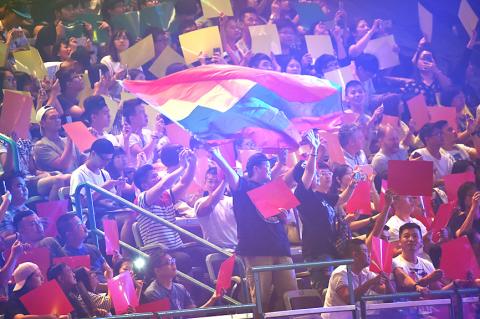Led by pop diva Chang Hui-mei (張惠妹), also known as A-mei (阿妹), 37 artists took part in a benefit concert at Taipei Arena at the beginning of this month to show support for the lesbian, gay, bisexual and transgender (LGBT) community.
The concert, Love is King. It Makes Us All Equal (愛最大), was organized to raise funds for the Taiwan Alliance to Promote Civil Partnership Rights (伴侶盟), which advocates legalizing same-sex marriage. The 10,000 tickets sold out within a minute, and millions of New Taiwan Dollars were donated to the alliance via ticket sales.
The strong show of support sent a clear message to the government. However, in the face of Asian’s biggest pro-LGBT concert in terms of the number of artists contributing to it, President Tsai Ing-wen (蔡英文) and her administration has yet to take any concrete actions.

Photo courtesy of Outstanding Production
LGBT VARIETY SHOW
Meanwhile, LGBTalk Show (TA們說) — Taiwan’s first gay-themed variety show — received positive feedback after it premiered on YouTube on Thursday last week (www.youtube.com/watch?v=NzjwSRR5RuU).
The weekly variety show is co-hosted by gay rights activist Kristy Chu (曲家瑞) and entertainers Hero Tai (戴祖雄), William Liao (廖威廉) and Simon Xue (薛仕凌), who goes by the stage name MC40. The first episode received tens of thousands of views on the day of its release, and a new episode will air at 10pm every Thursday.

Photo: CNA
Despite the show’s popularity, TV stations have refused to carry it because they are concerned that some of the issues it may tackle could be sensitive or controversial, reported online news outlet ETtoday (東森新聞雲).
As these cases — and countless others — show, the central government and some media continue to euphemize the issue by appealing to a largely fictitious demographic that might be offended by the protection of LGBT people’s human rights.
However, quite a few cities and counties throughout the nation are taking the initiative to protect the LGBT community. The Taichung City Government’s ban on the barbaric practice of conversion therapy serves as a good example. The city’s Health Bureau issued a document on May 13 stating that medical institutions are prohibited from using the controversial treatment.
CONVERSION THERAPY BANNED
According to Shader Liu (劉信詮), a member of Taichung’s Gender Equality Committee, the policy was made because homosexuality is not an illness and therefore the practice is not necessary. Liu added that the pseudo-scientific therapy could lead to domestic violence, psychological trauma and even suicide.
“Conversion therapy used to be an ethical issue. Now it’s a legal issue,” Liu said, adding that any group — medical, civil or religious — practicing the treatment in Taichung is violating the Physicians Act (醫師法) and the Psychologists Act (心理師法).
Taichung’s committee is making a request for the Ministry of Health and Welfare to make the new rule applicable nationwide, so as to eliminate the treatment. From the pro-LGBT concert and online variety show to Taichung’s sensible policy, the call for the equal rights of LGBT people is loud and clear. What is the central government waiting for?

In the March 9 edition of the Taipei Times a piece by Ninon Godefroy ran with the headine “The quiet, gentle rhythm of Taiwan.” It started with the line “Taiwan is a small, humble place. There is no Eiffel Tower, no pyramids — no singular attraction that draws the world’s attention.” I laughed out loud at that. This was out of no disrespect for the author or the piece, which made some interesting analogies and good points about how both Din Tai Fung’s and Taiwan Semiconductor Manufacturing Co’s (TSMC, 台積電) meticulous attention to detail and quality are not quite up to

April 21 to April 27 Hsieh Er’s (謝娥) political fortunes were rising fast after she got out of jail and joined the Chinese Nationalist Party (KMT) in December 1945. Not only did she hold key positions in various committees, she was elected the only woman on the Taipei City Council and headed to Nanjing in 1946 as the sole Taiwanese female representative to the National Constituent Assembly. With the support of first lady Soong May-ling (宋美齡), she started the Taipei Women’s Association and Taiwan Provincial Women’s Association, where she

Chinese Nationalist Party (KMT) Chairman Eric Chu (朱立倫) hatched a bold plan to charge forward and seize the initiative when he held a protest in front of the Taipei City Prosecutors’ Office. Though risky, because illegal, its success would help tackle at least six problems facing both himself and the KMT. What he did not see coming was Taipei Mayor Chiang Wan-an (將萬安) tripping him up out of the gate. In spite of Chu being the most consequential and successful KMT chairman since the early 2010s — arguably saving the party from financial ruin and restoring its electoral viability —

It is one of the more remarkable facts of Taiwan history that it was never occupied or claimed by any of the numerous kingdoms of southern China — Han or otherwise — that lay just across the water from it. None of their brilliant ministers ever discovered that Taiwan was a “core interest” of the state whose annexation was “inevitable.” As Paul Kua notes in an excellent monograph laying out how the Portuguese gave Taiwan the name “Formosa,” the first Europeans to express an interest in occupying Taiwan were the Spanish. Tonio Andrade in his seminal work, How Taiwan Became Chinese,